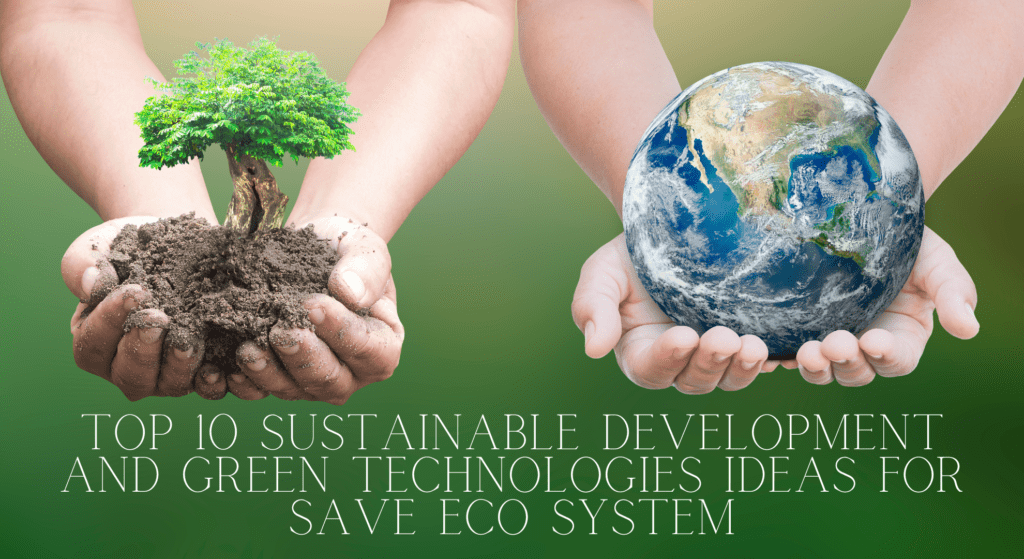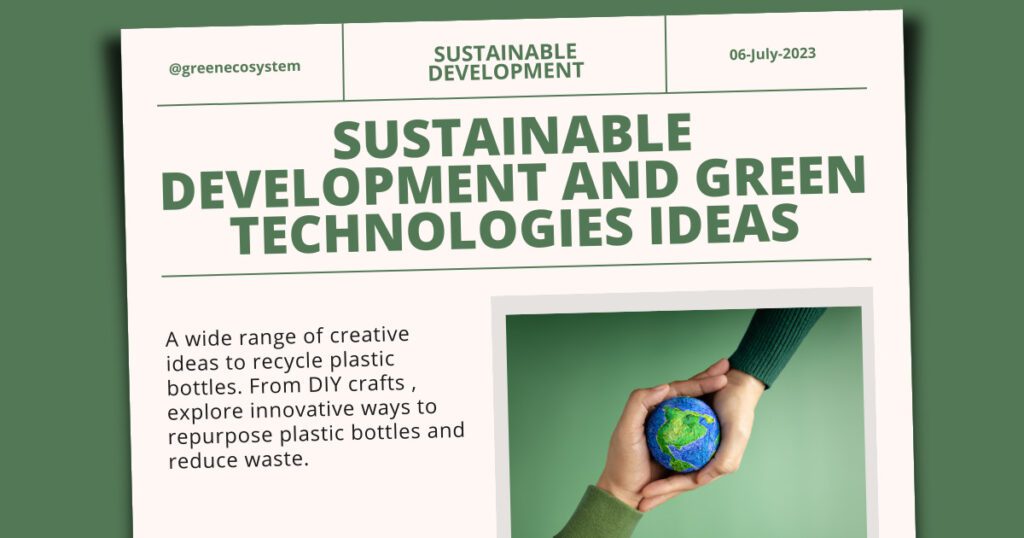
Introduction
In today’s rapidly evolving world, sustainable development and green technologies have become paramount in addressing the pressing environmental challenges we face. As we strive to create a greener ecosystem, innovative ideas and advancements in green technology play a crucial role. This blog explores the top ten ideas of sustainable development and green technologies that are shaping our world today, focusing on the concepts of green ecosystem, sustainable development, green technology, electric vehicles, and alternative fuels.
- Green Ecosystem
- Green Ecosystem
Creating a green ecosystem is fundamental to sustainable development. This idea revolves around nurturing and preserving the delicate balance of nature by implementing practices that minimize environmental harm and maximize conservation efforts. This includes protecting and restoring biodiversity, promoting sustainable land use, conserving water resources, and integrating green infrastructure in urban planning.
- Sustainable Development
- Sustainable Development
Sustainable development seeks to achieve a harmonious balance between economic growth, social progress, and environmental preservation. It emphasizes the need to meet present needs without compromising the ability of future generations to meet their own needs. This idea encompasses adopting sustainable practices across various sectors, such as renewable energy, waste management, sustainable agriculture, and responsible consumption and production.
- Green Technology
- Green Technology
Green technology refers to the development and application of environmentally friendly solutions that promote sustainability. This includes renewable energy technologies like solar and wind power, energy-efficient building designs, smart grid systems, and water conservation technologies. The integration of green technology across industries not only reduces carbon emissions but also fosters economic growth and job creation in the green sector.
- Electric Vehicles
- Electric Vehicles
The rapid adoption of electric vehicles (EVs) is revolutionizing the transportation sector and contributing to a greener future. EVs produce zero tailpipe emissions, reducing air pollution and dependence on fossil fuels. Advancements in battery technology and charging infrastructure are making EVs more accessible and convenient for consumers. The promotion of EVs through incentives and infrastructure development is crucial to achieving sustainable transportation systems.
- Alternative Fuels
- Alternative Fuels
Transitioning from fossil fuels to alternative fuels is a pivotal step toward achieving sustainable development goals. Biofuels, such as ethanol and biodiesel, offer renewable alternatives to traditional petroleum-based fuels. Hydrogen fuel cells and synthetic fuels derived from renewable energy sources also hold promise in decarbonizing transportation and industrial sectors. The development and widespread adoption of alternative fuels contribute to reducing greenhouse gas emissions and mitigating climate change.
- Embracing Green Technology Innovations
- Embracing Green Technology Innovations
Green technology, also known as clean technology, is at the forefront of sustainable development efforts. It encompasses various technological advancements that minimize negative impacts on the environment. These innovations include renewable energy sources like solar power, wind energy, and hydropower, which help reduce greenhouse gas emissions and reliance on fossil fuels. Green technologies also involve energy-efficient appliances, smart grids, and sustainable building materials that promote energy conservation and eco-friendly practices.
- The Rise of Electronic Vehicles
- The Rise of Electronic Vehicles
One of the most significant developments in sustainable transportation is the adoption of electric vehicles (EVs). EVs have gained popularity due to their lower carbon emissions and reduced dependence on fossil fuels. As battery technology improves and charging infrastructure expands, EVs are becoming more accessible and practical for everyday use. Governments and private companies are investing in EV research and development, promoting the widespread use of these vehicles and reducing greenhouse gas emissions from the transportation sector.
- Circular Economy: Reducing Waste, Promoting Recycling
- Circular Economy: Reducing Waste, Promoting Recycling
The concept of a circular economy aims to minimize waste and promote the efficient use of resources. Instead of the traditional linear “take-make-dispose” approach, a circular economy focuses on reusing, recycling, and regenerating materials. This includes initiatives such as implementing comprehensive recycling programs, encouraging product design for longevity and recyclability, and promoting the use of recycled materials in manufacturing processes. By adopting a circular economy mindset, we can reduce waste generation, conserve resources, and build a more sustainable future.
- Sustainable Agriculture and Farming Practices
Sustainable agriculture is an essential aspect of achieving a green ecosystem. It involves implementing practices that minimize environmental impact while ensuring food security. This includes organic farming, permaculture, agroforestry, and precision agriculture techniques. Sustainable agriculture promotes soil health, reduces water usage, minimizes chemical inputs, and preserves biodiversity. By embracing sustainable farming practices, we can protect ecosystems, enhance food quality, and promote long-term agricultural sustainability.
- Green Infrastructure and Sustainable Urban Planning
- Green Infrastructure and Sustainable Urban Planning
Creating sustainable cities and infrastructure is crucial for a greener future. Sustainable urban planning focuses on designing cities and communities prioritizing energy efficiency, waste management, and green spaces. It involves incorporating sustainable building designs, such as green roofs, rainwater harvesting systems, and efficient public transportation systems. Sustainable urban planning also emphasizes the development of walkable and bike-friendly neighborhoods, reducing reliance on cars and promoting healthier, more sustainable modes of transportation.
Conclusion
Sustainable development and green technologies are at the forefront of efforts to create a greener and more sustainable world. Embracing a green ecosystem, promoting sustainable development practices, harnessing the power of green technology, adopting electric vehicles, and exploring alternative fuels are key ideas driving the transformation toward a more sustainable future. By embracing these ideas and implementing them on a global scale, we can mitigate the environmental challenges we face and create a world that is cleaner, greener, and more resilient for generations to come.

